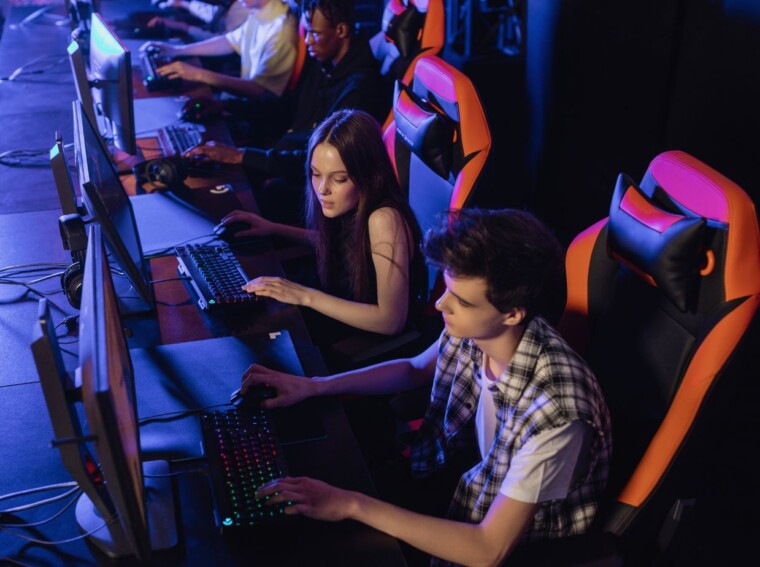While people often debate the distraction video games pose to students we shouldn’t overlook the valuable lessons multiplayer games offer. Multiplayer games deliver real-time communication and collaborative problem-solving abilities beyond their basic pixel graphics and level designs. Students benefit from multiplayer games because they develop social skills applicable to both school life and everyday interactions. We should take a closer look at how multiplayer games help students develop their social skills.
Communication Happens Naturally
Constant communication through talking, typing, or pinging remains essential for players participating in multiplayer games. Students develop their communication abilities by speaking up during games like Valorant matches, Minecraft building sessions, and League of Legends strategy planning. Players develop their abilities to deliver instructions clearly and request assistance while expressing ideas during high-pressure situations. That’s real communication practice. The game mechanics lead players to develop essential skills without their awareness. This process leads to improved social confidence, which students demonstrate in classroom settings and group assignments.
Teamwork Becomes a Skill, Not a Buzzword
Most video games require players to work together to succeed. Overwatch matches and Destiny raids require good teamwork to achieve victory. Students soon discover that they fail when they choose to play independently or disregard their team. Through repeated experimentation, they gain knowledge about team roles and mutual respect, which teaches them to function effectively as a unified group. This represents true cooperation that goes beyond simple joint play. The players develop skills to assist their teammates while knowing when to recede and when to lead during challenging moments.
Conflict Resolution is Part of the Game
Disagreements happen often in multiplayer settings. Team issues occur when someone fails to execute a strategy correctly or when players ignore instructions and teammates argue over their approach to challenges. The frustration you feel during these moments serves as a valuable lesson.

Students must learn to cool down and talk through their disagreements to find solutions so they can continue playing and winning. Students learn emotional regulation and problem-solving skills without needing to attend tedious conflict management lectures. Students who develop resilience through game conflict resolution learn to handle real-life situations better during group projects or academic challenges.
Leadership Skills Start to Show
Multiplayer games transform players into leaders rather than mere followers. Team-based games require a person to emerge as a guide for their teammates. The role requires players to call out plays while organizing teammates and providing guidance to new players. Students get to practice leadership skills in a relaxed environment through multiplayer games. Students develop decision-making abilities and learn to inspire teammates while also taking accountability for team outcomes, whether they win or lose. Students who develop leadership skills during games can apply them to school activities, such as managing class presentations or coordinating study groups. The goal is to support team improvement instead of commanding people.
Students Learn from Diversity
Through online gaming, students regularly communicate with individuals from various locations around the globe. Online gaming environments require students to navigate cultural differences alongside language and humor variations and to adjust to various time zones. At first, this might feel overwhelming. Eventually, it will be one of the most valuable elements of the experience. Students develop adaptive communication skills and learn to respect diverse perspectives while collaborating with teammates who hold different viewpoints. Through these experiences, students develop skills to manage diversity in their campus environment, workplace settings, or regular day-to-day interactions.
In fact, here are a few ways students grow through diverse multiplayer experiences:
- Become better at reading social cues
- Improve active listening skills
- Get comfortable with unfamiliar accents or speech patterns
- Practice respectful disagreement
- Learn new cultural references or traditions
Confidence Grows Through Interaction
Games provide an outlet for students who experience shyness or discomfort in real-world social situations. Some people find the digital space safer because it allows them to express themselves and lead without worrying about judgment. Gradually, their confidence begins to transfer from games to face-to-face interactions. The classroom participation of students who used to remain silent often increases after they develop their social confidence through gaming experiences. Academic pressure becomes more manageable when students recognize that they have previously navigated stressful, fast-paced scenarios with others.

Some of these same students reach out to us saying, “Please do my homework today,” and we always help them with any project. Just like in gaming, knowing when to ask for help is a sign of strength, not weakness. Whether it’s teaming up in a game or requesting support with homework, these are habits that support growth.
Leveling Up Social Skills, One Match at a Time
Multiplayer games provide fun entertainment along with multiple opportunities. Students gain practical skills in communication, empathy, and leadership through gaming in an enjoyable way that doesn’t feel like work. Although not all game sessions produce instant success, consistent small interactions create meaningful results. Students learn social tools during gaming experiences, which they maintain after stepping away from the screen. It feels great to pick up valuable knowledge through an enjoyable activity. Your understanding will improve next time someone claims gaming is useless. Sometimes, it’s exactly where real growth happens.
